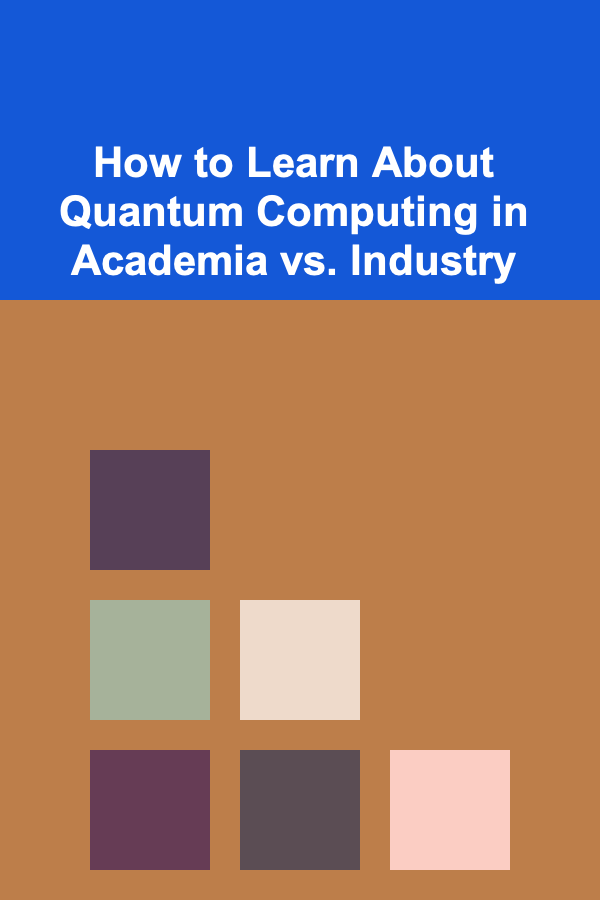
How to Learn About Quantum Computing in Academia vs. Industry
ebook include PDF & Audio bundle (Micro Guide)
$12.99$5.99
Limited Time Offer! Order within the next:

Quantum computing is a rapidly evolving field that promises to revolutionize industries ranging from cryptography to drug discovery. While its theoretical foundations were laid down in academia, the practical application and commercial potential of quantum computing have become a major focus of industry. The journey to learning about quantum computing can differ significantly depending on whether you are in an academic environment or the industry. This article will delve into how to approach learning quantum computing in both settings, exploring the different paths, challenges, resources, and mindsets required to succeed.
Understanding the Distinction: Academia vs. Industry
Before we dive into how to learn quantum computing in these two environments, it is essential to understand the key distinctions between academia and industry in terms of quantum computing.
- Academia is focused on deep, theoretical understanding and innovation. In the academic world, quantum computing research often explores new algorithms, computational models, and the mathematical foundations of quantum mechanics. The goal is to advance knowledge in a broad and foundational sense, often with fewer immediate practical applications.
- Industry, on the other hand, prioritizes practical solutions and the commercialization of quantum technologies. Companies in the quantum computing space are typically focused on building quantum hardware, developing software tools, and finding real-world applications for quantum systems. The emphasis is on applying quantum theories to solve specific, tangible problems---whether in optimization, machine learning, cybersecurity, or materials science.
While academia and industry have distinct objectives, the line between the two is increasingly blurred. Many academic researchers collaborate with industry partners, and some companies also sponsor academic research. However, the approach to learning and advancing in the field differs significantly based on whether you are in an academic or industrial setting.
Learning Quantum Computing in Academia
Theoretical Foundations: A Strong Emphasis
In academia, learning quantum computing involves understanding the theoretical underpinnings of quantum mechanics, quantum algorithms, and quantum information theory. Here's how you can expect to learn about quantum computing in an academic environment:
-
Mathematical Rigor: Academia places a strong emphasis on mathematical and theoretical foundations. Quantum computing is deeply rooted in linear algebra, group theory, probability theory, and complex analysis. To get started, you will need to have a solid grasp of these mathematical tools. Key topics include vector spaces, quantum states, operators, and eigenvalues. This mathematical framework is essential for understanding how quantum computers operate and how quantum algorithms work.
-
Quantum Mechanics: A background in quantum mechanics is a must in academic quantum computing studies. Concepts such as superposition, entanglement, quantum interference, and the measurement process form the core principles on which quantum computing is based. Professors and textbooks will often spend significant time explaining these fundamental ideas in depth.
-
Quantum Algorithms : Once you understand the basic principles of quantum mechanics, academic learning often shifts to quantum algorithms. The development and analysis of quantum algorithms are central to the field. Prominent quantum algorithms such as Shor's Algorithm (for factoring large numbers) and Grover's Algorithm (for unstructured search) are key learning milestones in academic programs. Additionally, research in this area often extends to newer algorithms and optimization techniques.
-
Quantum Complexity Theory : In academia, students are encouraged to explore the limits of quantum computing in terms of computational complexity. What problems can quantum computers solve more efficiently than classical computers? This question leads to explorations of complexity classes such as BQP (Bounded-Error Quantum Polynomial Time) and NP-completeness. The aim is not necessarily to build a quantum computer, but to understand the theoretical framework in which such a machine could be possible.
-
Research-Oriented Approach: In academia, learning quantum computing often involves engaging in research projects. These projects allow students to delve into specialized topics within quantum computing and contribute new knowledge to the field. Whether through journal articles, research papers, or PhD dissertations, academic learning often culminates in original research contributions that push the boundaries of what is known about quantum computing.
-
Graduate Programs and Courses: Top universities such as MIT, Stanford, Harvard, and Oxford offer graduate programs in quantum computing or related fields. These programs are highly theoretical, focusing on the mathematical and physical aspects of quantum computing. You'll likely encounter graduate-level courses such as:
- Quantum Algorithms and Complexity
- Quantum Error Correction
- Quantum Cryptography
- Quantum Hardware and Physical Implementations
Pros of Learning in Academia
- Deep Theoretical Knowledge: Academia provides an opportunity to gain a profound and thorough understanding of quantum computing principles. Theoretical knowledge gained in academic settings forms the bedrock for pushing the boundaries of quantum computing research.
- Access to Leading Experts: In an academic setting, you have the opportunity to work directly with leading researchers in the field, which can be an incredible learning experience. You also gain access to academic publications and cutting-edge research.
- Long-Term Focus: Academia offers a long-term view of quantum computing, focusing on its potential over decades. The research-driven approach can foster significant breakthroughs that might not be immediately applicable but are essential for the future of the field.
Cons of Learning in Academia
- Slower Pace of Practical Application: Due to the focus on theory, academic environments might not offer the immediate hands-on experience with quantum hardware or software that is seen in industry.
- Limited Industrial Application: While academic research often leads to breakthroughs, the application of these innovations to real-world problems is not always emphasized. If you're eager to see your work have an immediate impact, this might be less satisfying.
Learning Quantum Computing in Industry
Practical Focus: Bridging Theory and Real-World Problems
In the industry, the focus shifts from theoretical knowledge to practical applications. Whether you're working for a company developing quantum computers or for a business using quantum algorithms to solve industry-specific problems, learning quantum computing in an industrial environment typically emphasizes the following:
- Quantum Hardware Development: One of the key areas of industrial quantum computing is hardware. Companies like IBM, Google, Intel, and Rigetti are working on developing scalable quantum computers. Learning in this environment often means gaining hands-on experience with quantum processors, quantum circuits, and quantum programming languages.
- Quantum Software and Algorithms : In industry, quantum computing software frameworks such as Qiskit (by IBM) or Cirq (by Google) provide platforms to interact with quantum hardware. Learning in the industry often focuses on writing quantum algorithms in these frameworks, as well as exploring areas like quantum machine learning and optimization. Learning might include optimizing algorithms for hardware constraints and using existing quantum programming tools to solve practical problems.
- Collaborative Work and Cross-Disciplinary Teams: The industrial approach to quantum computing often involves interdisciplinary teams that include quantum physicists, computer scientists, and engineers. Learning in the industry often involves collaborative work on practical projects, where your role might focus on improving specific aspects of quantum computing or adapting algorithms for particular use cases, such as cryptography or logistics.
- Commercialization: Industry's primary goal is to find applications for quantum computing that can be commercially viable. Learning in this environment focuses on applying quantum algorithms to real-world business challenges. This could include areas like secure encryption, financial modeling, drug discovery, and materials science. The emphasis is on achieving results that can be implemented and monetized in the short-to-medium term.
- Quantum Cloud Computing: With companies such as IBM and Amazon offering cloud-based quantum computing services, industry is increasingly leaning into cloud technologies. As a learner, this means you will have access to remote quantum systems, where you can run quantum programs without the need for a physical quantum computer. This cloud-based model is particularly advantageous for newcomers to quantum computing, as it eliminates the need for specialized hardware.
- Fast-Paced Learning and Adaptability: In industry, the pace of learning is often faster and more results-oriented. You'll likely need to adapt quickly to new technologies, programming languages, and hardware platforms. This environment is well-suited for those who want to learn by doing and solve real-world problems.
Pros of Learning in Industry
- Practical, Hands-On Experience: Industry offers immediate access to quantum hardware, software tools, and cloud-based quantum systems. You can work directly on solving real-world problems, which can provide immediate feedback on your skills.
- Industry-Relevant Applications: The focus is on solving practical problems in areas like cybersecurity, optimization, and artificial intelligence. Learning in this environment offers the opportunity to see the tangible impact of your work.
- Exposure to Cutting-Edge Technology: Industry often uses the latest quantum computing hardware and software, providing a great opportunity to work with the most advanced tools and technologies.
Cons of Learning in Industry
- Limited Theoretical Focus: While practical, industrial work may not offer the same depth of theoretical understanding as academic research. The focus is often on specific tasks, and the broader, foundational principles of quantum computing might be overlooked.
- Pressure to Deliver: In industry, the focus is on results and meeting deadlines. This can sometimes lead to less time for in-depth exploration of theoretical concepts or longer-term research.
Conclusion: Navigating the Path Between Academia and Industry
Learning quantum computing in academia vs. industry requires different approaches, mindsets, and goals. Academic learning provides deep theoretical knowledge and a strong foundation in quantum mechanics and quantum algorithms. It is ideal for those looking to contribute to the theoretical advancement of quantum computing or those aiming for a research-oriented career.
On the other hand, industry provides the opportunity for hands-on experience, practical application, and collaboration in a fast-paced, results-driven environment. It is ideal for those who want to apply quantum computing to real-world challenges and develop commercial solutions.
Ultimately, whether you pursue learning in academia or industry depends on your career goals, interests, and desired pace of learning. For many, the most rewarding path may involve navigating both realms---combining the theoretical rigor of academia with the practical innovation of industry to help drive the field of quantum computing forward.
Reading More From Our Other Websites
- [Organization Tip 101] How to Keep Pet Supplies Safe from Pests and Critters
- [Organization Tip 101] Why Organizing Your Kitchen Drawers Can Save You Time Cooking
- [Organization Tip 101] How to Manage Screen Time for Kids with an Organized Approach
- [Home Soundproofing 101] How to Optimize Your Gaming Room Soundproofing for Clearer, Undisturbed Play
- [Personal Care Tips 101] How to Prevent Razor Burn on Sensitive Skin: Expert Tips and Product Recommendations
- [Home Rental Property 101] How to Create a Kid-Friendly Environment in Your Family-Friendly Rentals
- [Home Pet Care 101] First Aid Kit Essentials for Pet Owners
- [Horseback Riding Tip 101] Memorable Moments on the Saddle: Fun Activities for Friends on Horseback
- [Scrapbooking Tip 101] DIY Layout Templates: Printable Tools to Streamline Your Scrapbooking Process
- [Organization Tip 101] How to Organize Jewelry Supplies for DIY Projects

How to Create a Cozy Holiday Atmosphere with Simple Decorations
Read More
How to Include Food and Water Essentials in Your Emergency Kit
Read More
How to Use Technology to Manage Office Supplies
Read More
How To Connect Your Mind and Body in Yoga
Read More
Conquering the Inner Critic: A Comprehensive Guide to Overcoming Imposter Syndrome
Read More
How to Manage Your Money as a Couple
Read MoreOther Products

How to Create a Cozy Holiday Atmosphere with Simple Decorations
Read More
How to Include Food and Water Essentials in Your Emergency Kit
Read More
How to Use Technology to Manage Office Supplies
Read More
How To Connect Your Mind and Body in Yoga
Read More
Conquering the Inner Critic: A Comprehensive Guide to Overcoming Imposter Syndrome
Read More